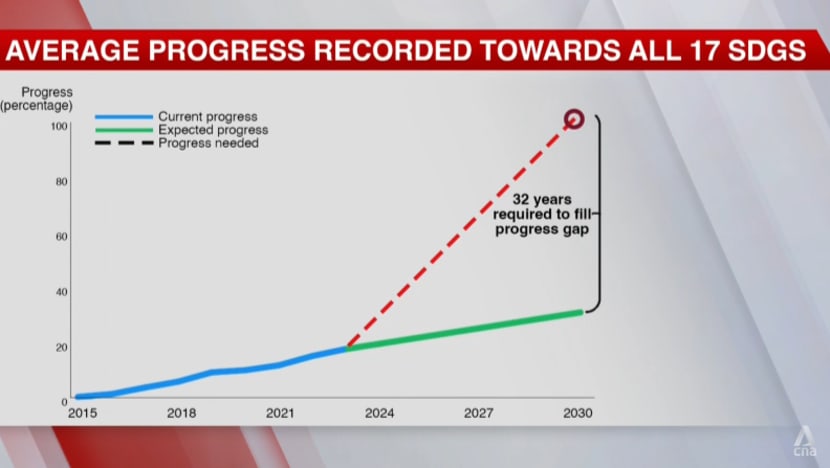Asia Pacific 32 years behind schedule in achieving sustainable development goals: UN
Progress towards implementing the global 2030 Agenda for Sustainable Development remains uneven and inadequate in Asia and the Pacific, said a UN regional commission.


This audio is generated by an AI tool.
Asia Pacific is woefully behind schedule in achieving its sustainable development goals (SDGs), according to the United Nations.
At the region’s current rate of progress, the goals will only be achieved by 2062 – putting it 32 years behind schedule, said the latest report by the organisation's Economic and Social Commission for Asia and the Pacific (ESCAP).
The agency said impact from the COVID-19 pandemic, ongoing conflicts and a constrained financial environment contributed to the inadequate progress.
“ALARMINGLY SLOW” PROGRESS
The 17 goals under the 2030 Agenda for Sustainable Development aim to eradicate hunger and extreme poverty, tackle diseases, reduce inequality, improve water management and energy, and take urgent action to combat climate change, among other issues.
The agenda was adopted by all 193 UN member states in 2015 and pledged to leave no nation behind.
But more than halfway into the 15-year deadline, progress on all 17 goals remains “alarmingly slow” among Asia Pacific nations, and not a single one is on track to be achieved by 2030, the report said.
“All countries across the whole region, whether rich or poor, need to do more,” Ms Rachael Beaven, director of the ESCAP’s statistics division, told CNA’s World Tonight on Friday (Feb 16).
“At the moment, we are very off track to meet the 17 SDGs. The most alarming one in this region is goal 13 – climate action.”
The report said progress towards climate action is “critically behind”, with greenhouse gas emissions continuing to increase.

APAC FACES GREATEST NATURAL DISASTER RISK
This is made even more worrying by the fact that Asia Pacific is the most disaster-prone region in the world, with many emerging economies facing the greatest human and financial risks from natural disasters.
The UN said bolstering disaster preparedness and recovery capacities is imperative to the region to protect lives and livelihoods, reduce economic losses and prevent people from being pushed back into poverty.
Other pressing goals for the region include the need to improve access to employment and support economic growth, and accelerate progress towards responsible consumption and production. Action is also needed to protect life below water and on land, and to strengthen partnerships for the goals.
The report said these areas recorded the least progress, with less than 10 per cent of the targets on track.
Areas that have shown substantial progress are eliminating poverty, and bolstering sustainable industry, innovation and infrastructure. Even so, steps taken so far are insufficient to meet the 2030 targets for both goals, the report said.
It attributed the sluggish performance to an unfavourable global environment.
Numerous economies have yet to fully recover from the COVID-19 pandemic. Ongoing conflicts, both within and outside the region, have also disrupted global supply chains, stoked inflation and created lingering uncertainty.
The report added that recalibrating domestic policies is crucial to meeting these challenges.
DATA COLLECTION
However, some success stories have emerged from the region in recent years, particularly in data collection and usage, said Ms Beaven.
“A lot of nations across the region are using much more detailed information on causes of death, such as to address maternal mortality, and looking at the specific causes to work out the best policies,” she said.
Still, she said there is a need to address data gaps that continue to hinder the comprehensive assessment of the goals’ progress.
“We don't have enough data to be able to really identify what specific policies are needed within each individual country, which will also be very context-specific. We need much more detailed data (for better assessment),” she said.
“We want to invest in data systems because once we have that data, then we can identify which groups are being left behind most, and decide which policies are needed to help those groups.”

















